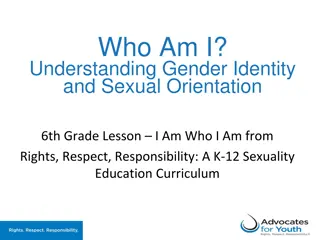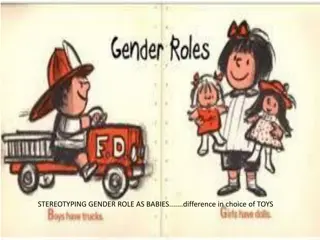Understanding Gender, Gender Roles, and Sexuality in Society
Gender encompasses social expectations, while sex refers to biological differences. Gender roles are culturally learned and vary, leading to disparities like the gender pay gap. Exploring concepts of sexuality highlights the importance of respect and consent. Understanding these aspects sheds light on societal norms and challenges.
Download Presentation

Please find below an Image/Link to download the presentation.
The content on the website is provided AS IS for your information and personal use only. It may not be sold, licensed, or shared on other websites without obtaining consent from the author. Download presentation by click this link. If you encounter any issues during the download, it is possible that the publisher has removed the file from their server.
E N D
Presentation Transcript
Gender and Gender Roles Gender and Gender Roles
Gender Sex Gender refers to the expectations that people have from some one because they are male or female. It refers to difference between men and women within the same HH and between cultures that are socially and culturally constructed and change over time. Sex is the physical and biological difference between men and women. It is universal and static. Sex is the biological characteristic of being male and female which is genetically determined.
Gender roles are learned, and vary within and among cultures depending on socio-economic factors, age, education, ethnicity and religion. Women prepare and serve food in the home Boys don t cry Teaching jobs are best suited for women, men have more technical jobs Girls are gentle; boys are tough. Men drive cars/ buses/ fighter jets/ autorickshaws/ trucks. Men s voice break at puberty; women s don t. Women are better at caring for children than men. Women are emotional, men should not display their emotions. Boys play outdoors; girls tend to enjoy playing inside the house.
Gender Gaps Women earn only ten percent of the world s income, but are responsible for 66 percent of overall working hours. Two-thirds of children who are denied primary education are girls, and 75 percent of the world s 876 million illiterate adults are women. Worldwide, women hold only fourteen percent of parliamentary seats, and only eight percent of the world s cabinet ministers are women.
Concepts of Sexuality People express their sexuality through both +ve and ve attitudes and behavior. Sexuality expressed +vely thru consensual, mutually respectful and protected (non abusive) rns, enhances well being, health and quality of life. Sexuality expressed vely thru violence, harassment, abuse diminishes a person s dignity and self worth causing long term harm.
Concepts of Sexuality Which areas of the body can strangers touch/ look? Which areas of the body can people who are close to you touch/ look? Which areas of the body can you touch in public? Which areas of the body can colleagues or seniors touch? What feeling do we have if a person touches us in a place that is out of bounds ? How much control do we have over where and how people touch/ look you? Men and women experience their body in relation to private, public and work spaces very differently
Personal Boundaries and Comfort A boundary around oneself that protects you from invasion and harm. Individuals experience their personal boundaries differently. People have different comfort zones for different individuals with whom they interact It is only after a sexual behavior, of whatever degree, has crossed someone s boundaries that the question arises of whether it was welcome or unwelcome

























